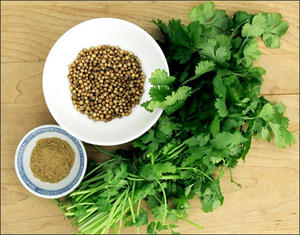Public healthCoriander oil tackles food poisoning and drug-resistant infections
Coriander oil has been shown to be toxic to a broad range of harmful bacteria; its use in foods and in clinical agents could prevent food-borne illnesses and even treat antibiotic-resistant infections, according to the authors of a study published in the Journal of Medical Microbiology

Coriander leaves and seeds, the seeds yielding oil // Source: tindachieu.com
Researchers from the University of Beira Interior in Portugal tested coriander oil against twelve bacterial strains, including Escherichia coli, Salmonella enterica, Bacillus cereus, and meticillin-resistant Staphylococcus aureus (MRSA). Of the tested strains, all showed reduced growth, and most were killed, by solutions containing 1.6 percent coriander oil or less.
Coriander is an aromatic plant widely used in Mediterranean cuisine. Coriander oil is one of the twenty most-used essential oils in the world and is already used as a food additive. Coriander oil is produced from the seeds of the coriander plant and numerous health benefits have been associated with using this herb over the centuries. These include pain relief, ease of cramps, and convulsions, cure of nausea, aid of digestion, and treatment of fungal infections.
A Society for General Microbiology release reports that this study not only shows that coriander oil also has an antibacterial effect, but provides an explanation for how it works, which was not previously understood. “The results indicate that coriander oil damages the membrane surrounding the bacterial cell. This disrupts the barrier between the cell and its environment and inhibits essential processes including respiration, which ultimately leads to death of the bacterial cell,” explained Dr. Fernanda Domingues who led the study.
The researchers suggest that coriander oil could have important applications in the food and medical industries.
“In developed countries, up to 30 percent of the population suffers from food-borne illness each year. This research encourages the design of new food additives containing coriander oil that would combat food-borne pathogens and prevent bacterial spoilage,” said Dr. Domingues. “Coriander oil could also become a natural alternative to common antibiotics. We envisage the use of coriander in clinical drugs in the form of lotions, mouth rinses and even pills; to fight multidrug-resistant bacterial infections that otherwise could not be treated. This would significantly improve people’s quality of life.”
